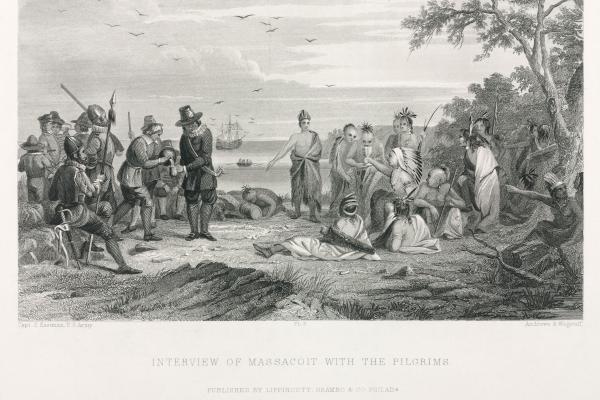"The antidote to feel-good history is not feel-bad history but honest and inclusive history." – James Loewen, Lies My Teacher Told Me, 92.
It’s becoming increasingly difficult for Americans to celebrate Thanksgiving. This Thanksgiving, as we take turns around the dinner table sharing why we are thankful, a sense of awkwardness settles in. The awkwardness is not only due to the “forced family fun” of having to quickly think of something profound to be thankful for. (Oh, the pressure!) The growing awkwardness surrounding Thanksgiving stems from the fact that we know that at the table with us are the shadows of victims waiting to be heard.
Humans have an unfortunate characteristic – we don’t want to hear the voice of our victims. We don’t want to see the pain we’ve caused, so we silence the voice of our victims. The anthropologist Rene Girard calls this silencing myth. Myth comes from the Greek worth mythos. The root word, my, means “to close” or “to keep secret.” The American ritual of Thanksgiving has been based on a myth that closes the mouths of Native Americans and keeps their suffering a secret.
As late as 1970, there were deliberate attempts to maintain the myth by keeping mouths shut. In his fascinating book Lies My Teacher Told Me, James Loewen tells the story of Frank James, a Wampanoag Indian who was selected to deliver a speech in celebration of the 350th anniversary of the Pilgrims’ arrival. The Massachusetts Department of Commerce arranged the celebration and demanded that James show them a copy of his speech. Here’s what they read:
Today is a time of celebrating for you … but it is not a time of celebrating for me. It is with heavy heart that I look back upon what happened to my People … The Pilgrims had hardly explored the shores of Cape Cod four days before they had robbed the graves of my ancestors, and stolen their corn, wheat, and beans … Massasoit, the great leader of the Wampanoag, knew these facts; yet he and his People welcomed and befriended the settlers … little know that … before 50 years were to pass, the Wampanoags … and other Indians living near the settlers would be killed by their guns or dead from diseases that we caught from them … Although our way of life is almost gone and our language is almost extinct, we the Wampanoags still walk the lands of Massachusetts … What has happened cannot be changed, but today we work toward a better America, a more Indian America where people and nature once again are important.
That was too much for the organizers of the celebration. After all, during a celebration nobody wants to hear the voice of their victims, so they didn’t allow James to read his speech. The Massachusetts Department of Commerce isn’t the only one mythically closing the mouths and keeping secret the story of Native Americans. As Loewen claims, “What the Massachusetts Department of Commerce censored was not some incendiary falsehood but historical truth. Nothing James would have said … was false … Most of our [High School] textbooks also omit the facts about grave robbing, Indian enslavement, and so on.” (91).
Loewen wrote his book in 1995, examining 12 of the most popular high school textbooks. He surveyed six new textbooks in 2006 for an updated version of his book. Unfortunately, most of the textbooks continued the myth. Why are our history books tainted by the myth? Because we want our history to feel good. We want to feel good about our ancestors. We identify with them and if we begin to question their moral goodness then we have to question our own moral goodness, too.
Thanks to historians like Loewen and Howard Zinn (A People’s History of the United States), we can no longer tell the myth that silences the voice of our victims. They are helping us reinvent Thanksgiving, and we should celebrate that fact. The truth of Thanksgiving, indeed, the truth of human history, is found when we listen to the voice of our victims. The point, as Loewen states in the quote that begins this article, is not to feel bad about our history, but rather to tell our history in an honest and inclusive way.
So, it may feel awkward, but celebrate this Thanksgiving. Celebrate the fact that we are beginning to tell our history in an honest and inclusive way, because only by telling an honest and inclusive history can we have an honest and inclusive present. That honesty and inclusivity is reason to give thanks.
Adam Ericksen blogs at the Raven Foundation, where he uses mimetic theory to provide social commentary on religion, politics, and pop culture. Follow Adam on Twitter @adamericksen.
Got something to say about what you're reading? We value your feedback!
